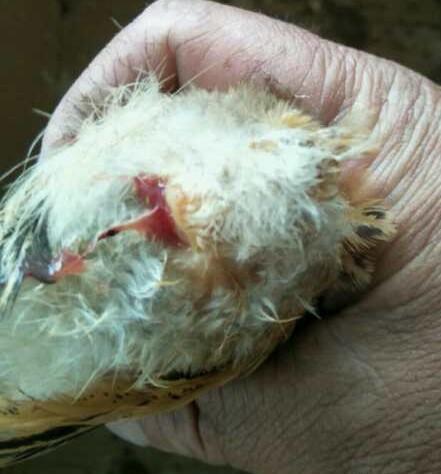As the weather also gets hotter and hotter, the problem of parasites in the later breeding is becoming more and more obvious, below, Xiaobian takes you to understand the common diseases in the summer - coccidiosis

Sick chickens are mainly manifested as mental depression, fluffy feathers, shrunken head, loss of appetite, full of liquid in the sac, crown and visible mucosa anemia, pale, gradually emaciated, sick chickens often discharge red radish-like feces, if infected with tender Amy's earworm, the feces at the beginning is coffee-colored, and later become complete blood feces, if not taken in time, the fatality rate can reach more than 50%. If multiple coccidiosis are mixed with infection, the stool carries blood and contains a large amount of shedding intestinal mucosa.
Acute coccidiosis: lack of energy and appetite, increased appetite; coarse hair; diarrhea, stool often with blood; anemia, visible mucous membranes, cockscomb, pale flesh; dehydration, skin shrinkage; decreased production performance; serious death, mortality rate of up to 80%, generally 20-30%. The recoverer grows slowly.
Chronic coccidiosis: seen in a small number of coccidiosis infections and less pathogenic coccidiosis infections. Thin, but mostly without blood. Reduced production performance and increased susceptibility to other diseases.
Several manifestations of coccidiosis symptoms:
1. The middle of the small intestine is dilated, the intestinal wall is thickened, and the contents are viscous, light gray, light brown or reddish.
2. A large number of pale white spots appear in the damaged intestinal segment of the epithelial surface.
3. In the anterior part of the small intestine, there are bleeding spots the size of large needles on the intestinal wall, and there is serious bleeding in the mucous membrane.
4. If a variety of coccidiosis are mixed infection, the intestinal tube is coarse, there are a large number of bleeding spots on the intestinal mucosa, and there is a large amount of purple-black blood with shedding intestinal epithelial cells in the intestinal tube.
Coccidiosis control
1. Strengthen feeding management, and feed adult chickens and chicks separately, so as to avoid the spread of pathogens in adult chickens with insects, resulting in the outbreak of coccidiosis in chicks.
2. Keep the chicken coop dry, ventilated and hygienic, remove feces regularly, and pile up; Fermentation to kill the egg sacs.
3. Keep the feed and drinking water clean, and disinfect the cages, feeding tanks and sinks regularly, generally once a week, and can be treated with boiling water, hot steam or 3% to 5% hot alkaline water.
4. Adding 0.25 to 0.5 mg of selenium per kilogram of diet can enhance the resistance of chickens to coccidiosis. Supplementing with adequate vitamin K and giving 3 to 7 times the recommended amount of vitamin A can accelerate recovery from coccidiosis in chickens.
Note: Coccidioides should not use vitamin B.
Today to share with you here, welcome to add and leave a message. Thanks for forwarding comments, your forwarding may help more farmers to learn more about farming knowledge, if this article has a little help to you hope to give a concern, more than one forward, what you see may be exactly what others need, if there are better suggestions and ideas, welcome to leave a comment, thank you for your support!